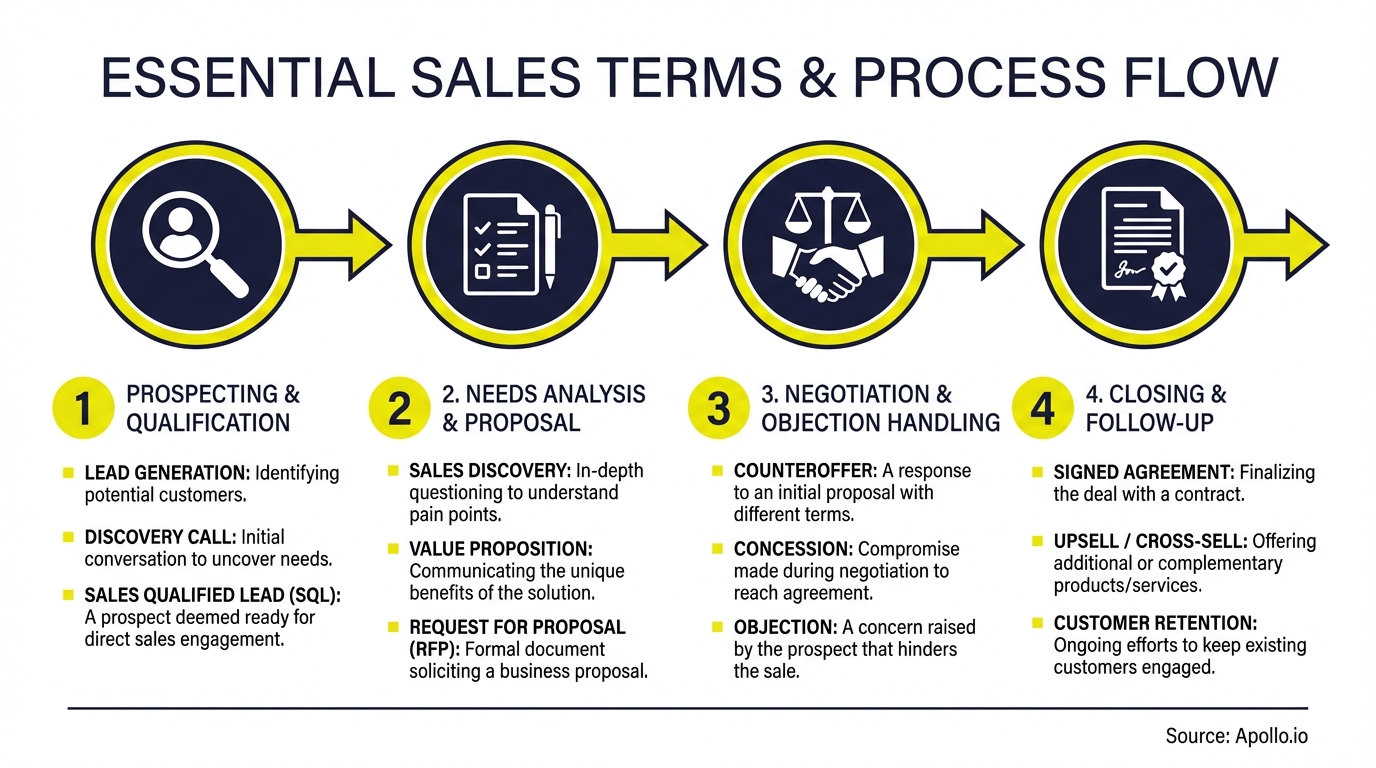What Are Sales Terms? Essential Language, Metrics, and Strategies (2026)

What Are Sales Terms? Essential Language, Metrics, and Strategies (2026)
Sales terms are the foundation of every deal, defining pricing, payment conditions, delivery expectations, and performance metrics that govern buyer-seller relationships. In 2026, mastering sales terminology directly impacts quota attainment, negotiation outcomes, and revenue predictability.
Whether you're an SDR qualifying leads or an AE closing enterprise contracts, fluency in sales terms accelerates deal velocity and reduces miscommunication.
Understanding sales terms goes beyond memorizing definitions. It's about applying the right language at the right stage, negotiating favorable conditions, and tracking metrics that drive revenue growth. With 84% of B2B reps missing quota in 2025, clarity around sales terms becomes a competitive advantage.

Apollo Finds Verified Contacts In Seconds
Tired of spending 4+ hours daily hunting for contact info? Apollo delivers 224M verified contacts with 96% email accuracy. Join 550K+ companies who eliminated manual research.
Start Free with Apollo →Key Takeaways
- Sales terms define pricing, payment, delivery, and performance conditions that govern B2B transactions and protect both parties.
- Core categories include contract terms (MSA, SOW), payment terms (Net-30, milestone billing), and performance metrics (quota, conversion rates).
- Quota attainment dropped significantly in 2026, making precise term negotiation and KPI tracking essential for hitting targets.
- Apollo consolidates prospecting, engagement, and deal management into one platform, eliminating confusion across multiple tools and vendor terms.
- Sales leaders who standardize terminology across teams report faster onboarding, clearer forecasting, and stronger alignment with buyers.
What Are Sales Terms and Why Do They Matter?
Sales terms are the specific conditions, definitions, and metrics that structure commercial relationships between buyers and sellers. They encompass contract language (scope, deliverables, warranties), payment conditions (Net-30, deposits, late fees), and performance expectations (KPIs, SLAs, attribution models).
In 2026, sales terms matter more than ever because buyers demand transparency and sellers need protection. Budget constraints push buyers toward tighter scopes and clearer ROI language. According to Rachel Krug's analysis, up to 70% of B2B sales representatives missed their annual quota in 2024, meaning only 30% hit their target. This quota pressure makes precise term negotiation critical for revenue teams.
Sales terms also reduce friction. When both parties agree on definitions upfront, deals close faster and disputes decrease. For Account Executives managing complex enterprise contracts, standardized terms create predictable workflows and clearer deal pipeline visibility.
What Are the Core Categories of Sales Terms?
Sales terms fall into three primary categories: contract terms, payment terms, and performance metrics. Each category addresses different aspects of the buyer-seller relationship.
Contract Terms: MSA, SOW, and Scope Definitions
Contract terms establish the legal and operational framework for engagements. Master Service Agreements (MSAs) define overarching terms like liability, confidentiality, and dispute resolution.
Statements of Work (SOWs) specify project scope, deliverables, timelines, and acceptance criteria. In 2026, buyers increasingly demand modular SOWs with clear inclusions, exclusions, and change-control processes to manage budget uncertainty.
Payment Terms: Net-30, Deposits, and Milestone Billing
Payment terms dictate when and how sellers receive compensation. Common structures include:
- Net-30/Net-60: Payment due 30 or 60 days after invoice date
- Upfront Deposits: Percentage paid before work begins (typically 25-50%)
- Milestone-Based Billing: Payments tied to project completion stages
- Late Fee Clauses: Penalties for overdue payments (often 1.5% monthly interest)
Performance Metrics: Quota, Conversion Rates, and Attribution
Performance terms define success measurement. Key metrics include quota (revenue target per rep), conversion rates (leads to opportunities to closed deals), and attribution models (first-touch, multi-touch, time-decay). Research from Martal Group shows only 2-5% of B2B leads typically convert into paying customers in 2026, making conversion tracking essential for forecasting accuracy.
How Do SDRs and AEs Use Sales Terms Differently?
SDRs and AEs operate at different funnel stages, requiring distinct term fluency. SDRs focus on qualification language and lead-scoring criteria.
They use terms like MQL (Marketing Qualified Lead), SQL (Sales Qualified Lead), BANT (Budget, Authority, Need, Timeline), and discovery call to filter prospects and set accurate expectations before handoff.
Account Executives negotiate deal structure and contract terms. AEs work with pricing tiers, discount approval thresholds, renewal terms, and SLA commitments. They translate buyer requirements into SOW language and manage stakeholder alignment across legal, procurement, and end-users. For AEs managing high-ticket enterprise deals, mastering negotiation terminology directly impacts close rates and deal size.
Struggling to keep deal terms organized across your pipeline? Centralize contract tracking and stage management with Apollo's deal management platform.

What Payment Terms Should Sales Teams Negotiate in 2026?
Payment term negotiation balances seller cash flow against buyer procurement constraints. In 2026, standard Net-30 terms remain common, but sellers increasingly push for deposits and milestone-based structures to mitigate risk.
Effective payment term strategies include:
- Tiered Deposits: Higher deposits (40-50%) for new clients, lower (25%) for established relationships
- Early Payment Discounts: 2-3% discount for payment within 10 days (2/10 Net-30)
- Milestone Triggers: Payments tied to deliverable acceptance, not calendar dates
- Late Fee Enforcement: Automated reminders and 1.5% monthly interest clauses
- Subscription vs. Project Terms: Monthly recurring for ongoing services, milestone for one-time projects
Turn Forecast Guesswork Into Revenue Certainty
Pipeline forecasting a guessing game? Apollo's real-time deal tracking and lead scoring give you accurate visibility into every stage. Built-In increased win rates 10% with Apollo's intelligence.
Start Free with Apollo →How Do Sales Terms Impact Revenue Operations and Forecasting?
Sales terms directly affect forecast accuracy and revenue operations efficiency. Inconsistent terminology creates pipeline confusion. When reps define "qualified" differently, forecast reliability drops and resource allocation suffers.
RevOps teams standardize terms through:
- Unified Stage Definitions: Clear criteria for moving deals between pipeline stages
- Standardized Discount Approval: Tiered thresholds requiring manager, VP, or C-level sign-off
- Consistent Attribution Models: Single source of truth for marketing contribution and sales credit
- SLA Documentation: Service-level agreements tied to contract terms and customer success handoffs
Tired of juggling multiple tools to track terms, pipeline, and performance? Consolidate your go-to-market stack with Apollo's unified revenue platform.
What Sales Metrics and KPIs Should Teams Track in 2026?
Sales metrics provide objective measurement of performance against targets. In 2026, teams focus on metrics that directly correlate with quota attainment and revenue predictability.
| Metric | Definition | 2026 Benchmark |
|---|---|---|
| Quota Attainment | Percentage of reps hitting revenue targets | 16% (84% missing quota) |
| Lead Conversion Rate | Percentage of leads becoming customers | 2-5% |
| Sales Cycle Length | Average days from first contact to close | 10.1 months (down from 11.3) |
| Win Rate | Percentage of opportunities won vs. lost | Varies by industry (20-30% typical) |
| Average Deal Size | Mean contract value across closed deals | Segment-specific |
Research from Corporate Visions indicates the average sales cycle length dropped from 11.3 months in 2024 to 10.1 months in 2025. Teams tracking cycle length by deal size and segment can identify bottlenecks and optimize sales KPIs for faster closes.
How Should Sales Leaders Standardize Terms Across Teams?
Terminology standardization starts with documentation and reinforcement. Sales leaders create term glossaries, embed definitions in CRM systems, and conduct regular training on usage consistency.
Practical standardization steps:
- Build a Living Glossary: Document all contract, payment, and metric terms with examples
- CRM Field Standardization: Use dropdown menus and required fields to enforce consistent data entry
- Onboarding Integration: Make term fluency part of new hire certification (test knowledge before live calls)
- Weekly Reinforcement: Review term usage in pipeline reviews and deal post-mortems
- Cross-Functional Alignment: Sync sales terms with marketing (lead definitions) and customer success (SLA language)
What Sales Terms Will Matter Most in 2026 and Beyond?
Emerging sales terms reflect changing buyer behavior and technology adoption. In 2026, terms around AI governance, usage-based pricing, and outcome-based contracts gain prominence.
Key emerging terms include:
- Usage-Based Pricing: Charges tied to consumption metrics (seats, API calls, compute credits) rather than flat subscriptions
- Outcome-Based SLAs: Performance guarantees tied to business results, not activity metrics
- AI Disclosure Clauses: Contract language specifying when AI tools are used, data handling, and quality assurance processes
- Multi-Touch Attribution: Credit allocation across multiple marketing and sales touchpoints (replacing last-touch models)
- Expansion Revenue Terms: Upsell and cross-sell language built into initial contracts with defined triggers and pricing
Start Closing Deals with Clarity and Confidence
Sales terms are more than jargon. They're the precise language that accelerates deals, protects revenue, and aligns teams around shared definitions.
In 2026, mastering sales terminology directly correlates with quota attainment and forecast accuracy.
For SDRs qualifying leads, AEs negotiating contracts, and RevOps leaders standardizing processes, term fluency reduces miscommunication and speeds decision-making. With quota attainment at historic lows, every advantage matters.
Sales professionals who speak the language of contracts, payments, and metrics close deals faster and negotiate better terms.
Apollo consolidates prospecting, engagement, and deal management into one unified platform, eliminating the confusion of managing terms across multiple tools. As one customer shared, "We reduced the complexity of three tools into one" (Predictable Revenue).
Another noted, "We cut our costs in half" (Census).
Ready to simplify your sales stack and accelerate deal velocity? Start Your Free Trial and experience how Apollo brings clarity to every stage of your sales process.
Prove Apollo's ROI In Your First 30 Days
Budget approval stuck on unclear metrics? Apollo delivers measurable pipeline impact from day one—track time saved, meetings booked, and revenue generated. Built-In increased win rates 10% and ACV 10% with Apollo's intelligence.
Start Free with Apollo →
Kenny Keesee
Sr. Director of Support | Apollo.io Insights
With over 15 years of experience leading global customer service operations, Kenny brings a passion for leadership development and operational excellence to Apollo.io. In his role, Kenny leads a diverse team focused on enhancing the customer experience, reducing response times, and scaling efficient, high-impact support strategies across multiple regions. Before joining Apollo.io, Kenny held senior leadership roles at companies like OpenTable and AT&T, where he built high-performing support teams, launched coaching programs, and drove improvements in CSAT, SLA, and team engagement. Known for crushing deadlines, mastering communication, and solving problems like a pro, Kenny thrives in both collaborative and fast-paced environments. He's committed to building customer-first cultures, developing rising leaders, and using data to drive performance. Outside of work, Kenny is all about pushing boundaries, taking on new challenges, and mentoring others to help them reach their full potential.
Don't miss these
Sales
Inbound vs Outbound Marketing: Which Strategy Wins?
Sales
What Is a Sales Funnel? The Non-Linear Revenue Framework for 2026
Sales
What Is a Go-to-Market Strategy? The Data-Driven Blueprint That Actually Works
See Apollo in action
We'd love to show how Apollo can help you sell better.
By submitting this form, you will receive information, tips, and promotions from Apollo. To learn more, see our Privacy Statement.
4.7/5 based on 9,015 reviews
